Digital Branding Strategies
How to Choose the Right Brand Development Agency: A Step-by-Step Guide
Overview
This article serves as a comprehensive guide for selecting the ideal brand development agency. It emphasizes critical factors such as:
- Experience
- Portfolio diversity
- Client testimonials
- Cultural fit
- Communication style
Each of these elements is essential for fostering a successful partnership, as they align the agency’s capabilities with the client’s branding needs. By doing so, they ultimately drive effective marketing strategies and facilitate business growth.
Introduction
In the dynamic realm of branding, the significance of brand development agencies has reached unprecedented heights. These specialized firms transcend the mere creation of logos and taglines; they emerge as strategic partners, guiding businesses in defining their identity within a saturated marketplace. By merging creative design, strategic planning, and comprehensive market research, these agencies construct compelling narratives that resonate with consumers and cultivate brand loyalty.
As the intricacies of branding continue to evolve, recognizing the critical role of these agencies becomes indispensable for businesses aspiring to excel. With case studies illustrating substantial successes and expert insights highlighting the value of effective branding, this article embarks on an exploration of the multifaceted world of brand development agencies. It will examine their services, outline key considerations when selecting an agency, and identify the essential elements for a fruitful partnership.
Understanding Brand Development Agencies: What They Are and Their Importance
Brand development agencies are pivotal in shaping, managing, and evolving identities to meet the demands of today’s competitive landscape. They empower businesses to define their identity and establish a robust market presence, effectively communicating with their target audience through strategic planning, innovative design, and thorough market research. These firms craft captivating narratives that resonate with consumers.
The significance of a brand development agency is highlighted by its capacity to enhance visibility and foster customer loyalty—both essential for driving business growth. Statistics reveal that an effective employer reputation can reduce new hire expenses by up to 50%, underscoring the financial advantages of a strong identity. Furthermore, as we approach 2025, the importance of brand development agencies continues to grow as companies navigate the complexities of identity in an increasingly saturated market.
Remarkable initiatives, such as the extensive campaign for Quaker Oats, exemplify the effectiveness of identity development agencies. This initiative focused on creative identity development and digital outreach, resulting in heightened recognition and a deeper connection with consumers. Additionally, success stories like the identity enhancement for Castania and the digital initiative for Motorola showcase the agency’s ability to deliver customized marketing solutions that yield measurable outcomes, including social media strategies, online and offline campaigns, and e-commerce approaches.
Expert insights further underscore the necessity of managing identities. As industry leaders assert, consumers today are not merely purchasing products or services; they are investing in the stories, values, and experiences that accompany them. This shift underscores the need for companies to connect meaningfully with their audience—a task best managed by a brand development agency that offers a comprehensive suite of services, including digital audits, website and app design, SEO consultancy, CRM strategy, and CRM implementation.
In comparative terms, companies like Toyota and Samsung illustrate the impact of effective marketing, with EBI scores of 88.3 and 93.2 respectively, emphasizing the competitive edge that robust identity development can provide across various markets.
In conclusion, a brand development agency is an essential partner for businesses aiming to enhance visibility and loyalty. Their expertise not only helps companies differentiate themselves from competitors but also drives sustainable growth in an ever-evolving market—a key focus for any brand development agency. WonderEight, with its unique approach of blending creativity with technology, exemplifies how specialized firms can adeptly navigate the branding landscape, offering integrated solutions that cater to the diverse needs of global businesses.
Does this inspire you? Contact us.
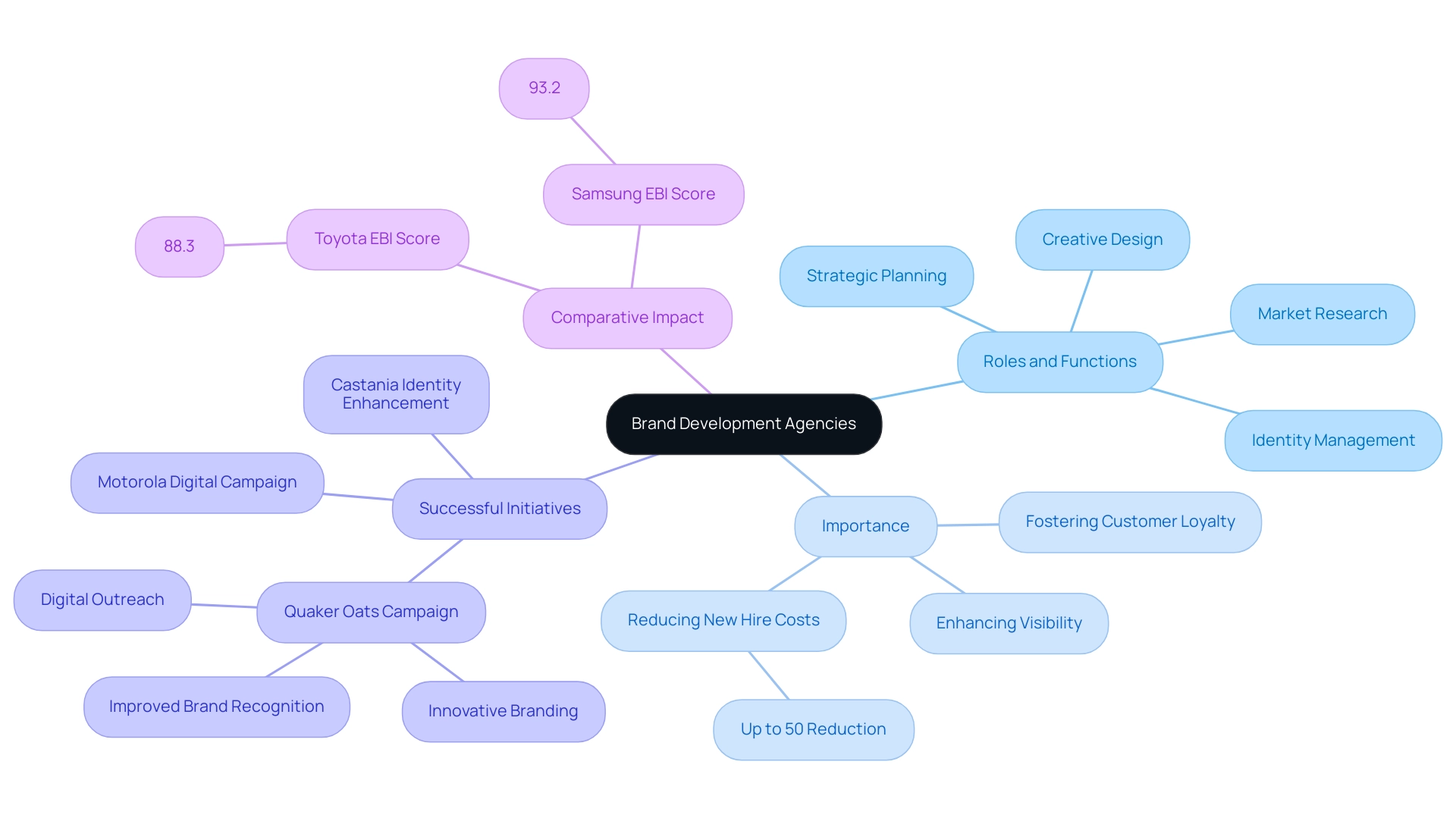
Key Factors to Consider When Choosing a Brand Development Agency
When selecting a brand development agency, several key factors should guide your decision-making process:
-
Experience and Expertise: Prioritize organizations with a solid track record in your specific industry. Their history of successful projects serves as a reliable indicator of their capability to deliver impactful results. Notably, organizations with extensive experience often achieve higher client success rates; statistics show that companies that grow faster drive 40 percent more of their revenue from personalization than their slower-growing counterparts. This underscores the importance of selecting a firm that can customize its strategy to address your distinct marketing requirements.
-
Portfolio Diversity: A comprehensive portfolio is essential. Reviewing an agency’s previous work allows you to assess their creative capabilities and stylistic range. Agencies showcasing a diverse array of projects demonstrate versatility and adaptability, crucial for addressing various branding challenges. For instance, WonderEight’s successful campaigns for brands across multiple sectors—including Technology, F&B, FMCG, Retail, Services, and B2B—highlight their ability to create engaging content that resonates with audiences globally, enhancing brand loyalty and market presence.
-
Client Testimonials: Gathering feedback from past clients is invaluable. Testimonials offer perspectives on client satisfaction and the firm’s effectiveness in meeting expectations. Positive evaluations suggest strong collaboration and successful results, emphasizing the significance of choosing a firm that aligns with your objectives. As Nelson Boswell aptly stated, “Here is a simple but powerful rule: always give people more than what they expect to get,” a principle that should guide your expectations of performance.
-
Cultural Fit: The alignment of values between your brand and the organization is critical. A shared ethos can significantly enhance collaboration and ensure that the organization understands your vision. This cultural compatibility fosters a more productive working relationship, ultimately leading to better results. WonderEight emphasizes a collaborative approach, working closely with clients to ensure their branding needs are met effectively.
-
Communication Style: Evaluate the organization’s communication approach. Effective communication is vital for a successful partnership, so assess how responsive they are to your needs and concerns. An organization prioritizing clear and open communication will likely be more attuned to your objectives and challenges. Additionally, consider how organizations are evaluated in customer service and support; for instance, Gartner’s Magic Quadrant provides insights into vendor reliability, a valuable resource in your selection process. Furthermore, WonderEight utilizes various channels to deliver tailored messages, ensuring that the right audience is reached effectively.
By considering these factors, you can make a more informed decision when selecting a brand development agency that will effectively support your branding initiatives and drive business growth. Furthermore, exploring options like Custify’s demo request can enhance client engagement and reduce churn, aligning with the communication style aspect of choosing a firm.
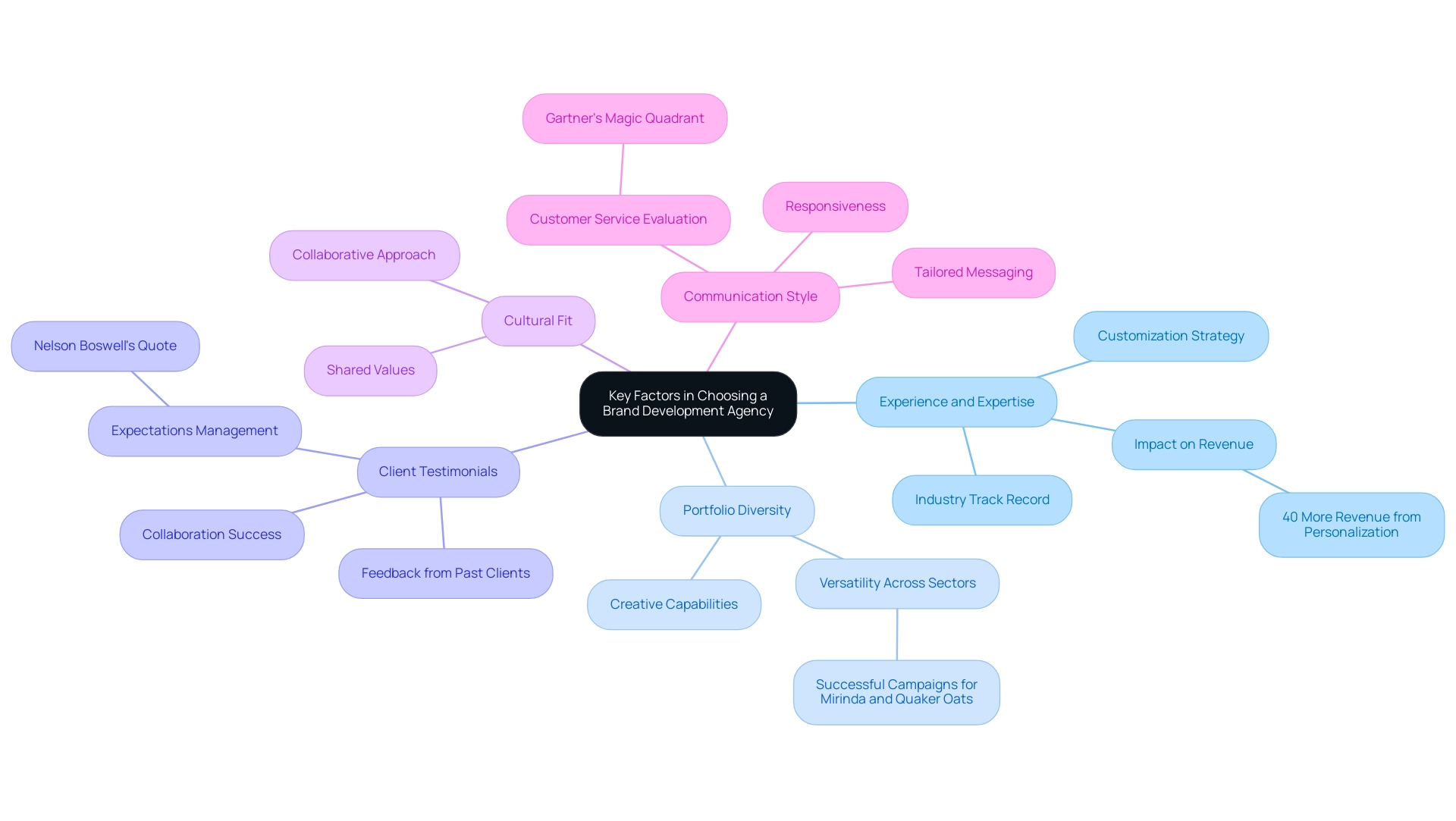
Essential Services Offered by Brand Development Agencies
A brand development agency offers a comprehensive suite of essential services crucial for establishing a robust market presence. These services encompass:
- Brand Strategy Development: Crafting a strategic plan that articulates the organization’s vision, mission, and market positioning is paramount. A well-defined marketing strategy is vital; notably, less than 10% of business-to-business (B2B) companies report having a consistent identity, underscoring the necessity for a structured approach. As Monique Solomons asserts, “Enhancing your branding involves understanding your target audience, clearly defining your unique selling proposition, consistently delivering your message across all platforms, creating a memorable logo and tagline, providing exceptional customer service, and regularly reviewing and refining your strategy based on market trends and customer feedback.”
- Visual Identity Design: Agencies create logos, color schemes, and typography that encapsulate the essence of the organization. Effective visual identity design significantly influences recognition, fostering customer trust and loyalty. An unforgettable logo and cohesive visual elements can attract new customers and enhance overall image perception.
- Market Research: Conducting thorough research is essential for understanding target audiences, market trends, and competitive landscapes. This insight enables companies to customize their strategies effectively, ensuring alignment with consumer expectations.
- Content Creation: Developing compelling messaging and content is crucial for communicating the story across various platforms. Consistency in messaging not only strengthens identity but also engages audiences more effectively.
- Digital Marketing: Implementing robust online strategies enhances visibility and engagement. This includes leveraging social media management, search engine optimization (SEO), e-commerce strategies, and CRM strategy to reach and connect with target audiences. WonderEight excels as a brand development agency, providing integrated branding and marketing solutions that drive impactful results.
- Digital Audits: Conducting digital audits helps companies assess their online presence and identify areas for improvement, ensuring that their digital strategies are effective and aligned with their overall goals.
The significance of these services is further demonstrated by successful case studies, such as the collaboration with Quaker Oats, where a refined marketing strategy led to a stronger market position and increased sales growth. This collaboration focused on aligning their messaging with consumer expectations and market trends, resulting in a more effective connection with their audience.
As branding continues to evolve, staying informed about the latest trends in identity strategy development is essential for firms to deliver impactful results. By combining creativity with technology, firms like this one ensure that their projects are not only visually appealing but also strategically sound, ultimately driving measurable outcomes for their clients. Notable client success stories, including the identity uplift for Castania and the digital campaign for Motorola, further demonstrate WonderEight’s effectiveness in achieving significant results.
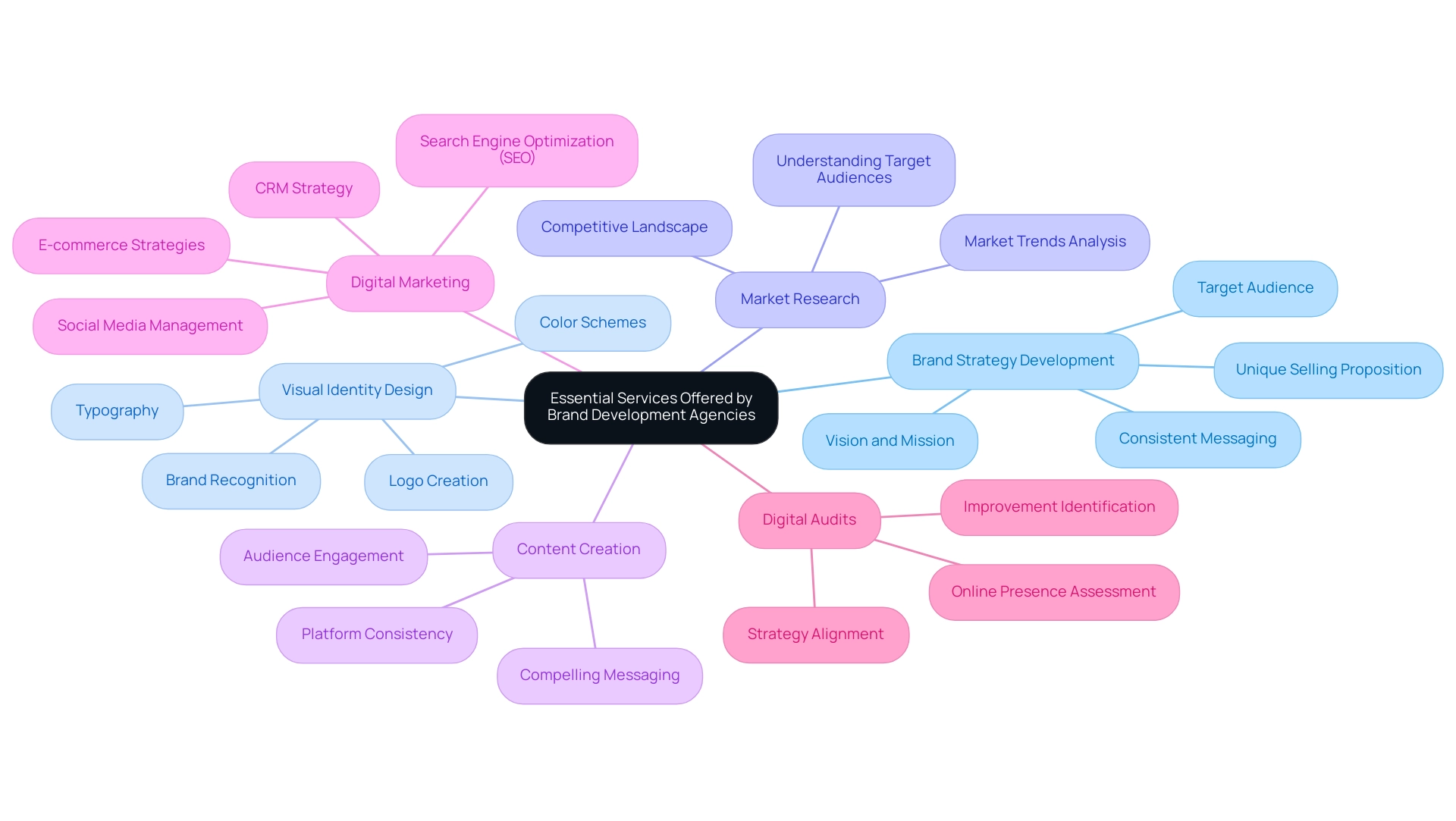
Evaluating Agency Experience and Expertise: What to Look For
When assessing a brand development agency’s experience and expertise, several key factors warrant your consideration:
-
Industry Experience: It is essential to evaluate whether the agency has a proven track record with businesses in your sector. Familiarity with industry-specific challenges and opportunities often leads to more effective strategies tailored to your needs. For instance, WonderEight has successfully collaborated with clients across diverse industries, including Technology, F&B, FMCG, Retail, Services, and B2B, showcasing its adaptability and understanding of various market dynamics.
-
Case Studies: Request detailed case studies that illustrate the agency’s ability to deliver measurable results. Look for specific metrics, such as increased engagement or sales growth, that highlight the agency’s effectiveness. The extensive campaigns executed by the agency for products like Miranda and Quaker Oats not only engaged audiences but also demonstrated significant ROI, underscoring the importance of experiential marketing in enhancing product perception. Experiential marketing significantly boosts brand perception and ROI, leading to increased investment in such initiatives, as evidenced by the success of these campaigns. Moreover, the company employs robust methods to measure ROI, ensuring clients can track the effectiveness of their marketing strategies.
-
Team Qualifications: Investigate the qualifications and backgrounds of the team members who will be directly involved in your project. Their expertise and experience can greatly influence the success of your branding initiatives. A well-rounded team with diverse skills can provide innovative solutions that drive results, as seen in WonderEight’s collaborative approach with clients from cities like New York, Mumbai, and Paris.
-
Awards and Recognition: Consider any industry awards or accolades the organization has received. Recognition from peers and industry bodies serves as a testament to the agency’s credibility and the quality of its work. For example, the company has been acknowledged with several awards for its innovative campaigns, enhancing its credibility and showcasing its capabilities in the marketing field.
-
Statistics on Agency Success: Understanding broader industry trends can also inform your decision. Statistics reveal that 70% of consumers are more likely to become repeat buyers after participating in experiential marketing, emphasizing the increasing significance of such strategies in product development. This trend aligns with the successful outcomes of the company’s campaigns, reinforcing its position as a leader in innovative branding and digital marketing solutions.
By concentrating on these aspects, you can make a more informed choice when selecting a brand development agency that aligns with your goals and can effectively elevate your brand’s presence in the market. As Melissa Scatena, a customer onboarding expert, observes, “Companies investing in streamlined, proactive, and personalized onboarding processes will distinguish themselves in 2025 and beyond,” highlighting the necessity for organizations like WonderEight to adapt to changing market needs.
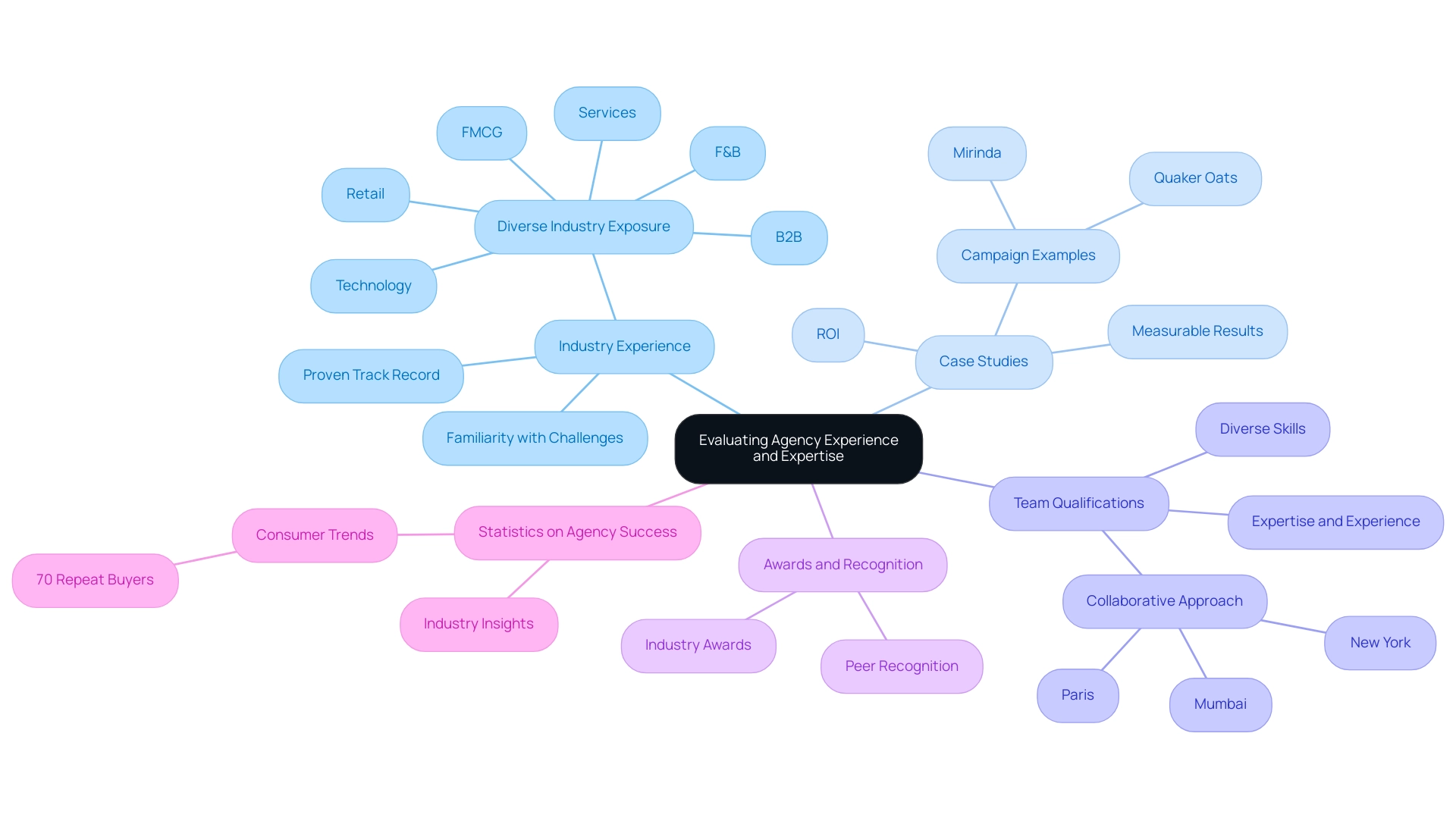
The Role of Chemistry and Communication in Agency Selection
Chemistry and communication are critical elements in the selection process at a brand development agency, profoundly impacting the success of branding projects. Consider the following factors:
- Initial Meetings: Observe the organization’s interactions during initial meetings. A strong rapport often indicates a promising working relationship, essential for effective collaboration.
- Transparency: Evaluate the organization’s openness in sharing information regarding their processes and strategies. Agencies that prioritize transparency foster trust, a vital component for a successful partnership.
- Feedback Mechanisms: Confirm that the organization has established methods for receiving and integrating client feedback throughout the project lifecycle. This responsiveness not only enhances project outcomes but also fortifies the client-agency bond.
- Cultural Compatibility: Assess whether the organization’s culture aligns with your own. Cultural fit can significantly influence collaboration, ensuring both teams work harmoniously towards shared goals.
Statistics reveal that over 75% of respondents attribute their prosperity to their ability to meet clients’ goals, underscoring the significance of effective communication and chemistry in these partnerships. Furthermore, case studies illustrate that organizations with strong client relationships consistently deliver superior results, particularly in successful branding projects managed by a brand development agency where chemistry played a pivotal role. For instance, organizations prioritizing senior management support for integrated marketing communications (IMC) have demonstrated enhanced alignment between marketing efforts and overall business objectives, emphasizing the strategic importance of chemistry and communication in partner selection.
As Jeff Tomlin, Chief Marketing Officer, observes, “To ensure our continued success, we regularly assess our ideal customer profile and adjust to these market changes,” highlighting the necessity for firms to maintain open lines of communication with their clients. Additionally, in the current market dynamics, it is noteworthy that 29% of firms had to discount their pricing due to the pandemic, potentially affecting client relationships. This context underscores the importance of establishing a robust foundation of communication and chemistry early in the selection process, as managing objections and closing deals are less challenging than the steps leading up to those points.
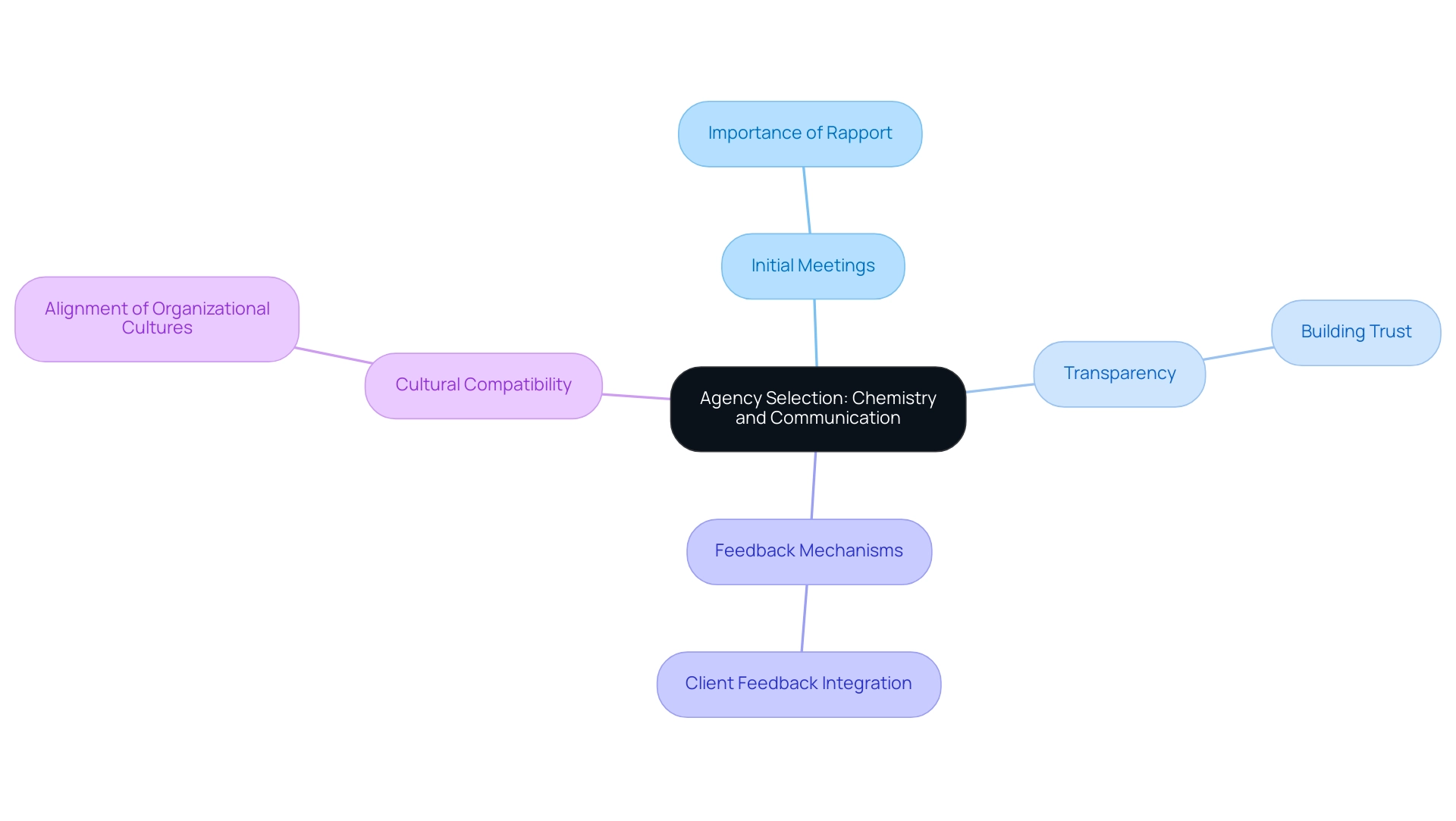
Understanding Pricing Structures and Budgeting for Brand Development
When budgeting for brand development, understanding the various pricing structures that agencies may employ is essential:
- Hourly Rates: Many marketing firms operate on an hourly fee structure, which can vary significantly based on the firm’s expertise and geographical location. For example, the average hourly rate for branding services in Asia is approximately $62, with countries like China and India offering a blend of affordability and innovative solutions. Larger firms in high-cost cities, such as Tokyo, may charge more due to their operational expenses, while smaller companies in emerging markets like Vietnam can provide competitive rates.
- Project-Based Fees: Certain firms offer fixed fees for specific projects, enabling clients to have a clear understanding of costs from the outset. This structure is particularly beneficial for businesses aiming to manage their budgets effectively.
- Retainer Agreements: For clients seeking ongoing support, retainer agreements are common. These arrangements ensure that organizations are available for continuous assistance, which can be advantageous for long-term branding strategies.
- Value-Based Pricing: In this model, fees are tied to the perceived value of the services rendered. This approach aligns the organization’s incentives with the client’s success, fostering a collaborative relationship.
- Budget Flexibility: Engaging in open discussions about your budget with prospective firms is crucial. This transparency can lead to tailored proposals that fit your financial constraints while still addressing your branding needs. For instance, Rafi Friedman, president of Coastal Luxury Outdoors, highlights the trend of utilizing freelancers in lower-cost states, which can yield savings of about 5 to 10% without compromising service quality.
Understanding these pricing structures is vital for effective budgeting in a brand development agency. Insights from case studies reveal that larger agencies in high-cost cities may charge more due to operational expenses, while smaller agencies in emerging markets can offer competitive rates. As Macy Storm, a content marketing consultant, observes, “13% of consumers are willing to pay up to 50% more for products or services if that company makes a positive impact on the world around them.”
By considering these factors, managers can make informed decisions that align their marketing goals with their financial capabilities.
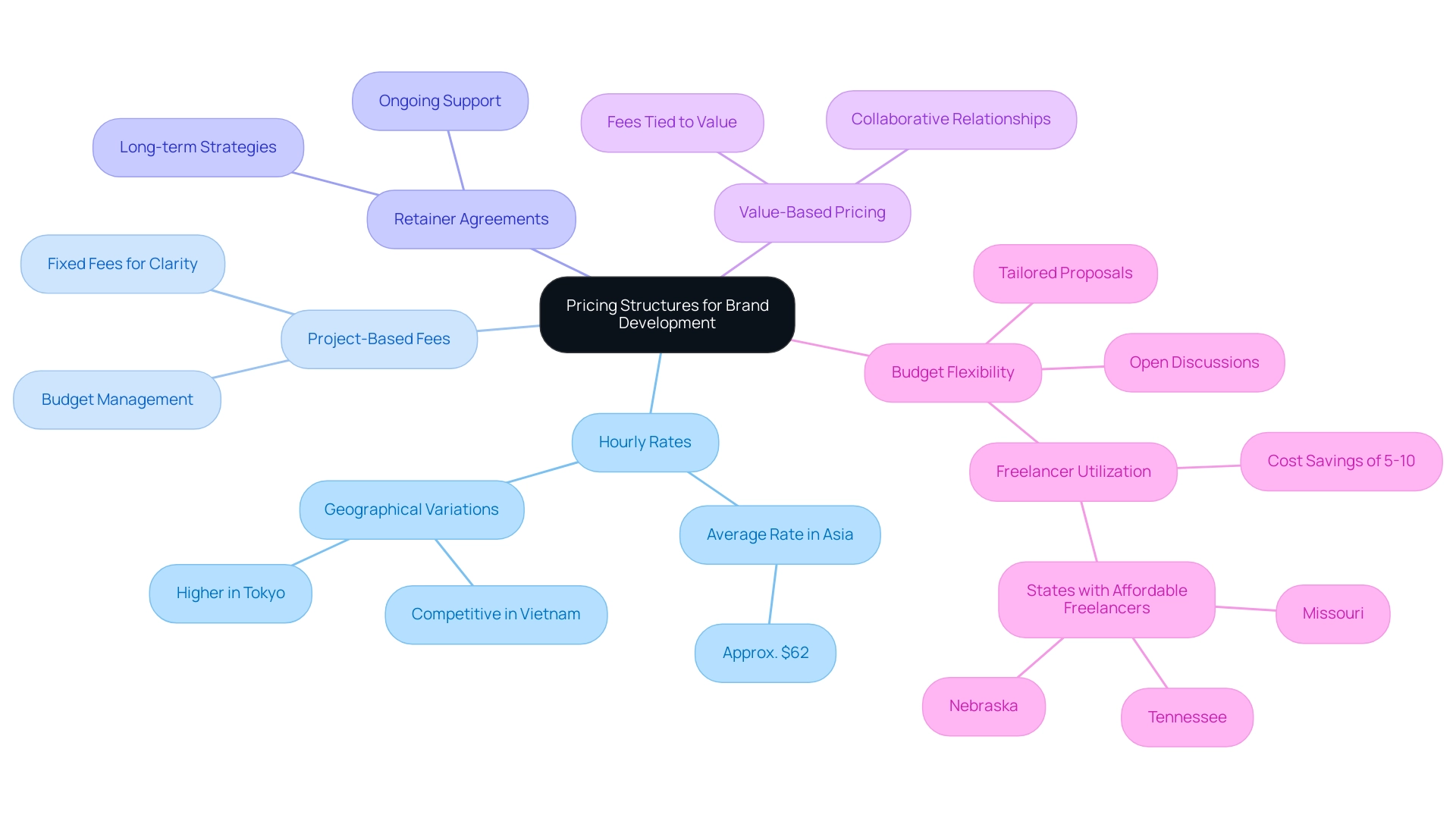
Aligning Values and Vision: Ensuring a Cohesive Partnership
To cultivate a successful partnership with a brand development agency like WonderEight, it is essential to focus on several key elements:
- Shared Values: Begin by discussing your brand’s core values. It is crucial that the agency not only understands these values but also aligns with them. A strong alignment can lead to more authentic and impactful branding efforts, as both parties work towards a common purpose.
- Vision Alignment: Clearly articulate your organization’s vision and goals. Evaluate if the approach of the company complements these objectives. Successful partnerships often hinge on this alignment; when both parties share a vision, they can collaborate more effectively to achieve desired outcomes. For instance, a marketing strategy created by the agency for Quaker Oats significantly improved the brand’s positioning in a competitive market, demonstrating how aligned visions can drive success and increase sales.
- Cultural Fit: Evaluate the organization’s culture and working style to ensure compatibility with your own team. A harmonious cultural fit can enhance communication and collaboration, making it easier to navigate challenges and innovate together. This aspect is particularly important as 44% of executives indicate that developing a strong sense of purpose within their organizations is a priority, which can be mirrored in agency partnerships. By cultivating a collective sense of purpose, both the organization and its partner can work towards mutual objectives more effectively.
- Long-Term Goals: Discuss your long-term ambitions and how this organization can assist in your growth over time. Establishing a shared understanding of future objectives fosters a proactive partnership, allowing both parties to adapt strategies as market dynamics evolve. Notably, 77% of businesses engaged in co-selling partnerships report increased profits, underscoring the potential benefits of strategic alignment in achieving mutual goals.
- Comprehensive Services: The company provides a variety of services, including audits, strategy formulation, packaging and collateral design, and gamification. By leveraging these services, companies can enhance their marketing efforts and ensure a cohesive approach to their branding initiatives.
As Brandon Greer, Senior Manager of Corporate Development at HubSpot, notes, “Using Crossbeam, I can more precisely identify the percentage of our base that is already a subscriber of The Hustle’s content.” This highlights the importance of data-driven insights in aligning values and vision in partnerships.
By concentrating on these aspects, companies can guarantee that their collaborations with a brand development agency are not only fruitful but also in harmony with their overall mission and values, creating the foundation for enduring success. The company’s expertise in audits, strategy development, digital marketing, packaging and collateral design, and gamification further positions them as a capable partner in this journey.
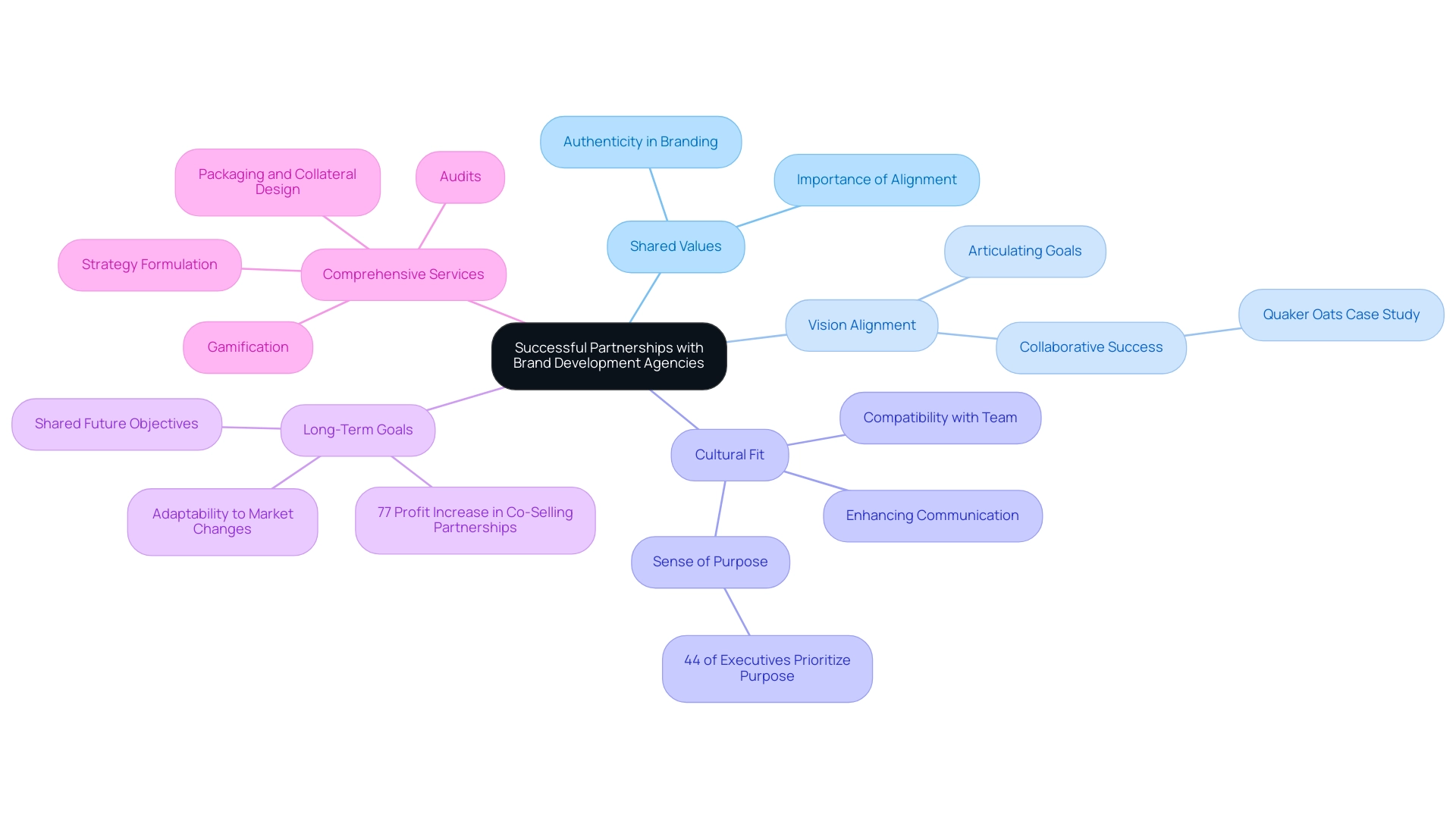
Onboarding and Collaboration: What to Expect After Choosing an Agency
When selecting a development firm like WonderEight, anticipate a structured onboarding and collaboration process that lays the foundation for a successful partnership. Here’s what to expect:
-
Kickoff Meeting: A kickoff meeting is essential for aligning on goals, expectations, and project timelines. This initial gathering establishes a shared vision and ensures that all stakeholders are on the same page. Organizations that prioritize these meetings often report higher satisfaction rates among clients.
-
Information Gathering: The agency will request comprehensive information about your company, target audience, and existing materials. This data is crucial for informing their strategic approach and tailoring solutions to your specific needs. Notably, 92% of HR professionals are familiar with using AI in the onboarding process, highlighting the relevance of technology in modern onboarding practices.
-
Regular Check-Ins: Establishing a schedule for regular check-ins is vital. These meetings provide opportunities to discuss progress, address any concerns, and offer feedback, fostering a collaborative environment.
-
Collaborative Tools: Utilizing collaborative tools and platforms enhances communication and project management. These resources ensure that all team members can easily access information and updates, streamlining the workflow.
-
Flexibility and Adaptation: Branding is inherently iterative, requiring flexibility and adaptation. Be prepared for adjustments based on feedback and market dynamics, as this responsiveness can significantly enhance the effectiveness of your marketing efforts.
The significance of kickoff meetings cannot be overstated; they lay the groundwork for successful collaboration. Comprehensive campaigns created for labels like Miranda and Quaker Oats exemplify how effective onboarding and collaboration can lead to increased loyalty and sales. By understanding what to expect during the onboarding process, you can better navigate your partnership with a branding agency and achieve your marketing goals.
Additionally, client success stories, such as the brand identity uplift for Castania and the digital campaign for Motorola, showcase measurable outcomes that reinforce the effectiveness of the agency’s approach. WonderEight’s global reach as a brand development agency, with clients spanning cities from New York to Mumbai, highlights their ability to deliver tailored marketing solutions across diverse industries. Furthermore, the agency employs various metrics to measure ROI, ensuring that clients can see the tangible benefits of their investment.
As Grace Lau, Director of Growth Content, notes, effective onboarding processes are crucial in making an organization an attractive employer.
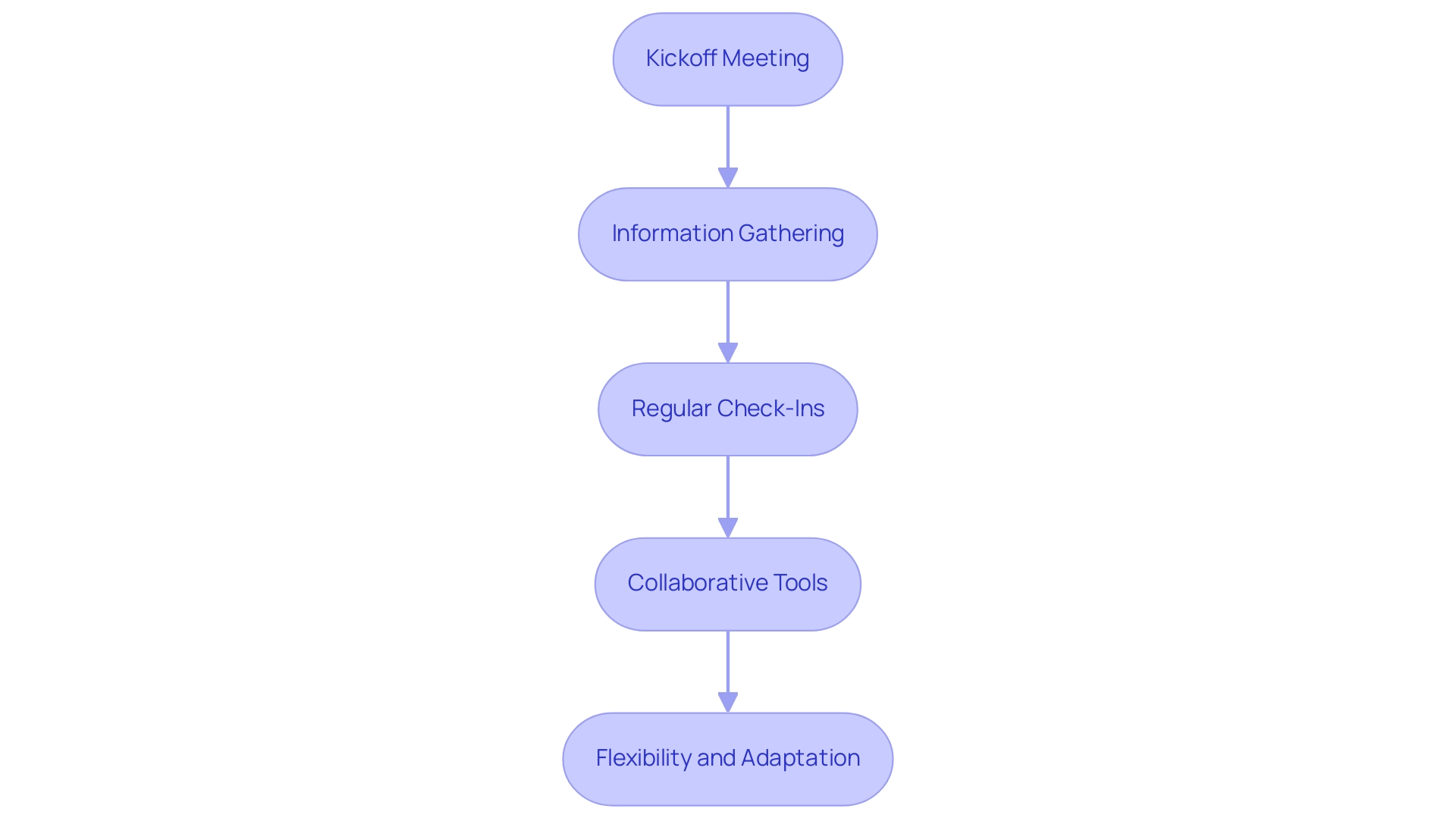
Conclusion
Brand development agencies serve as indispensable allies for businesses aiming to cultivate a distinct identity in an increasingly competitive marketplace. By leveraging strategic planning, market research, and creative design, these agencies not only enhance brand visibility but also forge deep connections with consumers—connections that are essential for building loyalty and driving growth. The insights shared in this article underscore the critical role these agencies play in crafting compelling brand narratives that resonate with target audiences.
When selecting a brand development agency, it is vital to consider factors such as experience, portfolio diversity, and cultural fit. These elements are crucial for fostering a fruitful partnership, ensuring that the agency can effectively align with a brand’s vision and values. Furthermore, understanding the essential services provided by these agencies—spanning from brand strategy development to digital marketing—can significantly influence a brand’s market presence and overall success.
As the branding landscape continues to evolve, the significance of establishing strong chemistry and communication with the chosen agency cannot be overstated. A collaborative approach, bolstered by transparent communication and a shared vision, creates an environment where both parties can thrive. By prioritizing these aspects, brands can maximize their potential and achieve sustainable growth.
Ultimately, partnering with a brand development agency like WonderEight exemplifies how creativity and technology can merge to navigate the complexities of branding. As businesses strive to enhance their market presence and engage meaningfully with consumers, the expertise offered by these specialized agencies remains a vital component in the pursuit of branding excellence.
Frequently Asked Questions
What is the role of brand development agencies?
Brand development agencies shape, manage, and evolve identities for businesses to meet competitive demands, helping to define identity, establish market presence, and communicate effectively with target audiences through strategic planning, design, and market research.
How do brand development agencies enhance visibility and customer loyalty?
They create captivating narratives that resonate with consumers, which enhances visibility and fosters customer loyalty, both of which are essential for driving business growth.
What financial advantages are associated with a strong brand identity?
An effective employer reputation can reduce new hire expenses by up to 50%, highlighting the financial benefits of having a strong brand identity.
Why is the importance of brand development agencies growing?
As we approach 2025, the complexities of identity in a saturated market increase, making the expertise of brand development agencies more critical for businesses.
Can you provide examples of successful initiatives by brand development agencies?
Successful initiatives include Quaker Oats’ extensive campaign for creative identity development, as well as identity enhancement for Castania and a digital initiative for Motorola, showcasing the ability to deliver customized marketing solutions.
What services do brand development agencies typically offer?
They provide a comprehensive suite of services including digital audits, website and app design, SEO consultancy, CRM strategy, and CRM implementation.
How do companies like Toyota and Samsung illustrate the impact of effective marketing?
They have achieved high EBI scores (88.3 for Toyota and 93.2 for Samsung), demonstrating the competitive edge that robust identity development can provide across various markets.
What factors should be considered when selecting a brand development agency?
Key factors include experience and expertise, portfolio diversity, client testimonials, cultural fit, and communication style.
Why is experience and expertise important in a brand development agency?
Agencies with a solid track record in a specific industry are more likely to deliver impactful results, as demonstrated by their history of successful projects.
How does portfolio diversity contribute to the effectiveness of a brand development agency?
A diverse portfolio showcases an agency’s creative capabilities and adaptability, which are essential for addressing various branding challenges.
What role do client testimonials play in selecting a brand development agency?
Testimonials provide insights into client satisfaction and the agency’s effectiveness, indicating strong collaboration and successful results.
Why is cultural fit important when choosing a brand development agency?
A shared ethos between your brand and the agency enhances collaboration and ensures that the agency understands your vision, leading to better outcomes.
How can communication style affect the partnership with a brand development agency?
Effective communication is crucial for a successful partnership; agencies that prioritize clear and open communication are more likely to align with your objectives and challenges.



